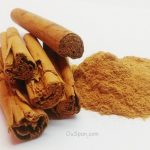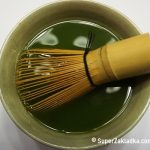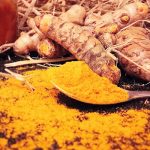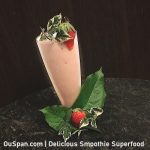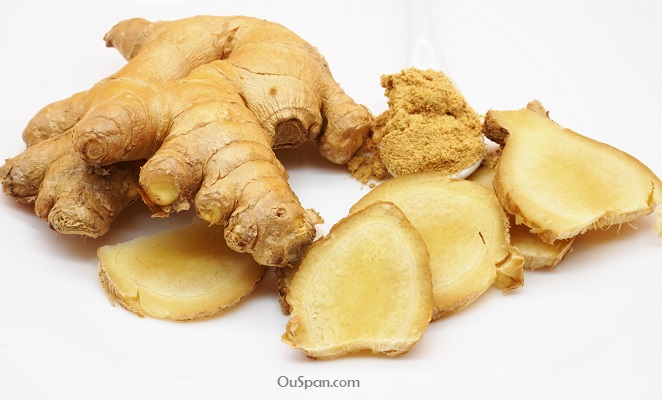
Takeaways
• Ginger is a unique spice with powerful anti-inflammatory and anti-oxidative effects
• Ginger helps reduce the risk of complications in diabetics
• Extracts of ginger have anticarcinogenic and antitumorigenic properties
• Ginger is associated with the ability to reduce body weight through different mechanisms
A tropical ginger plant belongs to the Zingiberaceae family that also includes cardamom and turmeric. Centuries ago, ginger health benefits have been recognized and used to treat a variety of diseases in traditional Chinese and Ayurvedic medicine.
Ginger made its way to other parts of the world in the early ages of the Spice Trade between Asia, Middle East, and Europe and since then it maintains its presence on plates, shelves, and in refrigerators of people all over the world.
A favorite spice in many cuisines, ginger can be used in sweet desserts, in meat, chicken and fish dishes. In North Africa, ginger is often combined with saffron, vanilla, coriander, and turmeric that provide a sweet-savory tone to a food. In Scandinavian countries, a combination of ground ginger, cinnamon, black pepper, cardamom, and ground cloves is used for gingerbread.
Today, there are many ginger forms: whole row, whole fresh, dried, powdered, crystallized, preserved and pickled. Also, ginger alcohol-free liquid extracts, ethanolic extracts, powder in capsules, essential oils, and tablets are available as supplements.
Health Benefits
Over 100 components have been found in fresh and dried ginger. However, the most health benefits of ginger root are primarily attributed by phenolic ketones: gingerols, shogaols, paradols, and zingerone. Also, a wide variety of vitamins and minerals presented in ginger in various amounts. The most significant percentage of daily value of minerals and vitamins would be attributed by manganese, magnesium, potassium, copper, vitamins B6 and C.
There are a number of positive beneficial effects associated with ginger consumption:
- Anti-inflammatory
- Anti-oxidative
- Antibacterial
- Diaphoretic (producing perspiration)
- Analgesic (painkiller)
- Anti-lipidemic (lipid-lowering) and anti-diabetic
- Anticarcinogenic and antitumorigenic
- Carminative (break up intestinal gas)
- Anti-clotting (blood thinner)
- Sedative
One tablespoon of ground ginger contains:

Health Conditions Controlled or Treated by Ginger Root
| Osteoarthritis & Rheumatoid Arthritis
Due to anti-inflammatory and analgesic properties, ginger is used for osteoarthritis and rheumatoid arthritis treatment.
Research with 247 participants has demonstrated that pure ginger extract significantly reduces symptoms of osteoarthritis of the knee. Another study reported that pain relief in osteoporosis was significant during oral ginger treatment and many patients were likely to discontinue this treatment.
According to a 2014 review in PubMed, Bioactive ginger molecules link to symptomatic relief of rheumatoid arthritis including inflammation and pain, and possible can stop the damage caused by this chronic inflammatory disorder.
| Cancer
Antioxidants gingerol and shogaol act by breaking down and removing free radicals generated during the oxidative process. That can be beneficial for lowering the risks of some forms of cancer as well as lowering risks of infections.
Some studies suggested that ginger can control and even prevent colorectal, gastric, ovarian, liver, skin, breast and prostate cancers by inhibiting cell-cycle progression, angiogenesis, and metastasis.
| Diabetes & Prediabetes
Strong evidence suggests that ginger can be beneficial for individuals with diabetes and prediabetes, it can help with diabetes complications. Some researches demonstrated that ginger can lower blood glucose, LDL or "bad" cholesterol, triglycerides and raise HDL "good" cholesterol in diabetic animal models or those that have been fed a high lipid diet.
An ethanolic extract of ginger (Zingiber officinale), orally consumed during 20 days, produced an excellent antihyperglycemic effect (reduced high blood sugar) in diabetic rats.
Conducted in 2015, the small human study suggested that ginger is a promising remedy for treating diabetic patients to reduce the risk of some complications. A consumption of 2 g/day of ginger powder supplement for 12 weeks decreased fasting blood sugar, the levels of hemoglobin A1c, apolipoprotein B, apolipoprotein A-I, apolipoprotein B/apolipoprotein A-I and malondialdehyde, and increased the level of apolipoprotein A-I in type 2 diabetic patients.
| Cardiovascular Health
High blood sugar (hyperglycemia) in diabetes increases the risk of coronary artery disorder, stroke, and peripheral vascular disease. Anti-lipidemic and anti-diabetic properties of ginger help reduce blood sugar levels, increase insulin levels, improve lipid profile and lower oxidative stress. All of those help diminish risk factors for cardiovascular diseases.
Ginger contains salicylates that have a blood-thinning or anti-clotting effect. If you take medications for blood thinning, talk to your health care professional before your ginger consumption.
According to publication in the Indian Journal of Traditional Knowledge, ginger was found to be effective in iron absorption and treatment of anemia. The ginger root assists in correcting the iron deficiency and, acting as an antioxidant, it helps prevent oxidative stress caused by iron supplementary therapy.
A 45-day study of patients with high levels of LDL cholesterol and triglycerides found that 3 grams of ginger capsules in 3 divided doses significantly lowered levels of triglyceride and LDL cholesterol and increased level of HDL "good" cholesterol.
Other studies on the animal models, reported that the liquid ginger extracts lower blood pressure and treat palpitation.
| Cognitive Function & Neurodegenerative Disorders
Oxidative stress and free radical actions are associated with cognitive declines with age, also free radicals are the risk factor of developing Alzheimer’s disease. Due to bioactive phytochemicals of ginger have a powerful anti-oxidative property, it can enhance cognitive function and working memory and fight against neurodegenerative disorders.
A study of 60 middle-aged women demonstrated that 0.4-0.8 g of the extract of ginger (Zingiber officinale) daily for 2 months improved both attention and cognitive processing.
| Metabolism
Ginger is associated with the ability to reduce body weight through different mechanisms. It was found that phenolic ketones of this plant help reduce blood sugar levels, improve fat and carbs metabolism, increase lipolysis, suppress lipogenesis, inhibit intestinal fat absorption, and control appetite.
According to the research, conducted by Institut of Human Nutrition, a hot ginger beverage is a metabolism booster. In this study, consumption with breakfast of 2 g ginger powder dissolved in a hot water reduced feelings of hunger, enhanced thermogenesis (calories burning) without affecting metabolic and hormonal parameters.
In another human study, it was suggested that ginger supplementation has potential in managing obesity.
| Muscle Pain Relief
Published in The Journal of Pain, the study has reported that consumption 2 grams both raw and heat-treated ginger for 11 days reduced muscle pain caused by eccentric exercise and following muscle soreness and injury.
| Gastro-Intestinal Tract
Ginger may reduce nausea, improves digestion, appetite, relieve motion sickness, dyspepsia and hyperemesis gravidarum.
Ginger root is effective for reducing nausea and vomiting during chemotherapy in cancer treatment (Pillai AK et al., 2011) and after surgery (Chaiyakunapruk N et al., 2006). Several studies have shown that 1-1.5 grams of ginger daily reduce nausea during pregnancy but isn't appear to be effective on vomiting episodes.
A 2016 review reported that ginger is effective in preventing or reducing Helicobacter pylori infection, a bacterium that causes stomach ulcers.
This is also a good idea to drink ginger tea or water after heavy or a high-fat meal, that helps improve digestion and empty your stomach faster.
| Infections
Ginger has diaphoretic properties. This means it promotes body warming from inside, sweating, and toxins elimination. Hot ginger tea with lemon and honey can be used as a natural remedy for cold, asthma, bronchitis, and flu symptoms.
A hot water extract of fresh ginger is effective against the human respiratory syncytial virus (RSV), contagious respiratory infections that can be serious for children and elderly people. The fresh ginger only (not dry) inhibits plaque formation on airway epithelium by blocking viral attachment to the mucous membranes (Chang et al., 2013).
Because its antibacterial properties, ginger can fight against of wide range of multidrug-resistant bacteria. The ethanolic extracts of ginger exhibit an antibacterial effect against respiratory tracts pathogens S. aureus, S. pyogenes, S. pneumoniae and H. influenzae (Akoachere et al., 2002).
The ethanolic extracts of ginger possess antibacterial effects against three types of bacteria, causing periodontal diseases (Park M. et al., 2008).
| Topical Home Remedy
A topical application of the fresh ginger juice aids in the healing process of thermal burns; the ginger essential oil might be used as a topical analgesic.
Grated ginger is used for the sinuses congestion in the form of compress on the forehead. To relieve the chest congestions put the compress on the chest.
Related
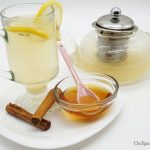 Ginger Side Effects - Recommended Dose
Ginger Side Effects - Recommended Dose
Ginger is generally safe if used it appropriately. However, there are possible side effects if consume it in high doses...
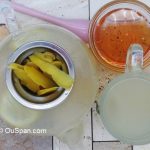 Ginger Drinks for Health – Cooking with Ginger
Ginger Drinks for Health – Cooking with Ginger
Utilize the beneficial properties of ginger by making ginger teas or water from raw or powdered ginger...
- Mashhadi NS, Ghiasvand R, Askari G, Hariri M, Darvishi L, Mofid MR. Anti-oxidative and anti-inflammatory effects of ginger in health and physical activity: review of current evidence. NCBI. 2013.
- Pillai AK, Sharma KK, Gupta YK, Bakhshi S. Anti-emetic effect of ginger powder versus placebo as an add-on therapy in children and young adults receiving high emetogenic chemotherapy. NCBI. 2010.
- Chaiyakunapruk N, Kitikannakorn N, Nathisuwan S, Leeprakobboon K, Leelasettagool C. The efficacy of ginger for the prevention of postoperative nausea and vomiting: a meta-analysis. NCBI. 2006
- Estelle Viljoen, Janicke Visser, Nelene Koen, Alfred Musekiwa. A systematic review and meta-analysis of the effect and safety of ginger in the treatment of pregnancy-associated nausea and vomiting. NCBI. 2014
- Altman RD, Marcussen KC. Effects of a ginger extract on knee pain in patients with osteoarthritis. NCBI. 2001
- Bartels EM, Folmer VN, Bliddal H, Altman RD, Juhl C, Tarp S, Zhang W, Christensen R. Efficacy and safety of ginger in osteoarthritis patients: a meta-analysis of randomized placebo-controlled trials. NCBI. 2015
- Abdullah Al-Nahain, Rownak Jahan, Mohammed Rahmatullah. Zingiber officinale: A Potential Plant against Rheumatoid Arthritis. NCBI. 2014
- Black CD, Herring MP, Hurley DJ, O'Connor PJ. Ginger (Zingiber officinale) reduces muscle pain caused by eccentric exercise. NCBI. 2010
- Khandouzi N, Shidfar F, Rajab A, Rahideh T, Hosseini P, Mir Taheri M. The Effects of Ginger on Fasting Blood Sugar, Hemoglobin A1c, Apolipoprotein B, Apolipoprotein A-I and Malondialdehyde in Type 2 Diabetic Patients. NCBI. 2015
- Ghayur MN, Gilani AH, Afridi MB, Houghton PJ. Cardiovascular effects of ginger aqueous extract and its phenolic constituents are mediated through multiple pathways. NCBI. 2005
- Alizadeh-Navaei R, Roozbeh F, Saravi M, Pouramir M, Jalali F, Moghadamnia AA. Investigation of the effect of ginger on the lipid levels. A double blind controlled clinical trial. NCBI. 2008
- Saenghong N, Wattanathorn J. Zingiber officinale Improves Cognitive Function of the Middle-Aged Healthy Women. NCBI. 2012
- Karuppiah P, Rajaram S. Antibacterial effect of Allium sativum cloves and Zingiber officinale rhizomes against multiple-drug resistant clinical pathogens. NCBI. 2012
- Park M, Bae J, Lee DS. Antibacterial activity of [10]-gingerol and [12]-gingerol isolated from ginger rhizome against periodontal bacteria. NCBI. 2008.
- Ebrahimzadeh Attari V, Asghari Jafarabadi M, Zemestani M, Ostadrahimi A. Effect of Zingiber officinale Supplementation on Obesity Management with Respect to the Uncoupling Protein 1 -3826A>G and ß3-adrenergic Receptor Trp64Arg Polymorphism. NCBI. 2015
- Mansour MS, Ni YM, Roberts AL, Kelleman M, Roychoudhury A, St-Onge MP. Ginger consumption enhances the thermic effect of food and promotes feelings of satiety without affecting metabolic and hormonal parameters in overweight men: A pilot study. NCBI. 2012
- Rashmi K, et al. Ginger supplementary therapy for iron absorption in iron deficiency anemia. Indian Journal of Traditional Knowledge. 2012.
